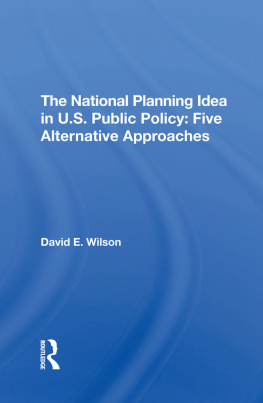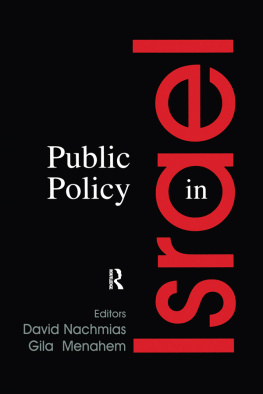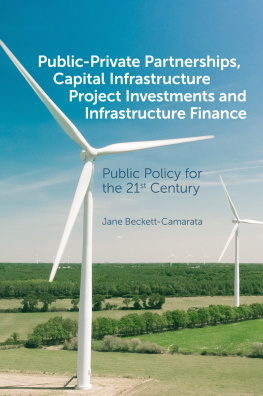The National Planning Idea in U.S. Public Policy
Other Titles in This Series
Getting It Off the Shelf: A Methodology for Implementing Federal Research, Peter W. House and David W. Jones, Jr.
Alternatives for Delivering Public Services: Toward Improved Performance, edited by E. S. Savas
Inside the Bureaucracy: The View from the Assistant Secretary's Desk, Thomas P. Murphy, Donald E, Nuechterlein, and Ronald J. Stupak
Life Cycle Costing: A Better Method of Government Procurement, M. Robert Seldon
The President, the Budget, and Congress: Impoundment and the 1974 Budget Act, James P. Pfiffner
Rhetoric and Reality: Presidential Policy Commissions and the Making of Public Policy, Terrence R. Tutchings
New Directions in Development: A Study of U.S. AID, Donald R. Mickelwait, Charles F. Sweet, and Elliott R. Morss
National Planning in the United States: An Annotated Bibliography, David E, Wilson
Westview Special Studies in Public Policy and Public Systems Management
The National Planning Idea in U.S. Public Policy: Five Alternative Approaches
David E. Wilson
This book explores the eventful but largely forgotten history of national planning efforts in the United States, first identifying and comparing five alternative approaches to contemporary national planning, then using these approaches to assess the events of 1973-1976, a period when crisis pressures brought a vigorous resurgence of national planning activity and debate. Dr. Wilson concludes that two new approaches to planning "learning-adaptive" and general systemsare increasingly being used in lieu of the long-established, and less flexible, rational and incremental approaches, and that these might eventually achieve a beneficial new synthesis in both federal policy practice and social science theory. He argues that the twin questions of a planned versus a planning society and of who will plan for whom are inexorably emerging as key issues in U.S. public policy.
Along with its companion volume National Planning in the United States: An Annotated Bibliography, also published by Westviewthis book provides extensive new interdisciplinary research material and integrative perspectives on current planning challenges.
David E. Wilson, senior research officer in the UN Joint Inspection Unit, Geneva, Switzerland, has served as management analyst and planning coordinator in the U.S. General Accounting Office.
The National Planning Idea in U.S. Public Policy: Five Alternative Approaches
David E. Wilson
First published 1980 by Westview Press, Inc.
Published 2019 by Routledge
52 Vanderbilt Avenue, New York, NY 10017
2 Park Square, Milton Park, Abingdon, Oxon OX14 4RN
Routledge is an imprint of the Taylor & Francis Group, an informa business
Copyright 1980 Taylor & Francis
All rights reserved. No part of this book may be reprinted or reproduced or utilised in any form or by any electronic, mechanical, or other means, now known or hereafter invented, including photocopying and recording, or in any information storage or retrieval system, without permission in writing from the publishers.
Notice:
Product or corporate names may be trademarks or registered trademarks, and are used only for identification and explanation without intent to infringe.
Library of Congress Cataloging in Publication Data
Wilson, David Eugene, 1939
The national planning idea in U.S. public policy.
(Westview special studies in public policy and public systems management)
Includes index.
1. United StatesEconomic policy. 2. United StatesSocial policy. 3. Planning. I. Title.
HC106.W65 309.2'3'0973 79-10204
ISBN 13: 978-0-367-29424-3 (hbk)
For Heidi, Mark, Kirk, and Scott, who waited a long, long time with much patience and grace
Contents
Tables and Figures
The ideas of economists and political philosophers, both when they are right and when they are wrong, are more powerful than is commonly understood. Indeed the world is ruled by little else. Practical men, who believe themselves to be quite exempt from any intellectual influences, are usually the slaves of some defunct economist. Madmen in authority, who hear voices in the air, are distilling their frenzy from some academic scribbler of a few years back. I am sure that the power of vested interests is vastly exaggerated compared with the gradual encroachment of ideas. Not, indeed, immediately, but after a certain interval; for in the field of economic and political philosophy there are not many who are influenced by new theories after they are twenty-five or thirty years of age, so that the ideas which civil servants and politicians and even agitators apply to current events are not likely to be the newest. But, soon or late, it is ideas, not vested interests, which are dangerous for good or evil.
John Maynard Keynes,
The General Theory of Employment,
Interest and Money, 1936
Trying is an idea whose time has also come.
Russell Ackoff,
Redesigning the Future, 1974
This book explores national planning ideas and efforts in the United States during the twentieth century, with particular emphasis on attempts to develop new national planning or societal guidance perspectives during the tumultuous period of the mid-1970s, and on five alternative approaches to national planning for the future.
The 1970s have drawn to a close amid considerable dissatisfaction and a widespread sense of societal drift. Doomsday has not arrived, but there are many serious problems and pressures in contemporary American society.
The basic strength of the U.S. economy is challenged by persistent inflation and unemployment, slow economic and productivity growth, rising claims on the national product to meet social and environmental needs, and much more modest expectations of what economic policy interventions can achieve.
American political activity has recently been marked by a "politics of disenchantment"; an emphasis on austerity and retrenchment as reflected in the major issues of taxes, inflation, and big government; and a single-issue or "me-first" style of highly aggressive political competition among interest groups and lobbies.
In international affairs, the steady decline in the value of the dollar reflects strong foreign doubts about U.S. ability to control inflation and reduce heavy dependence on oil imports. It also reflects the growing economic, political, and technological strength of other countries, which has diminished the long-standing American world leadership role.
In addition, American attitudes appear to be undergoing significant, if uncertain, change. Pessimistic observers note the self-centered nature of the "me decade," widespread indifference and cynicism, the triumph of image over substance throughout American society, and a "crisis of cultural legitimacy." Yet more optimistic observers believe that current societal turbulence is bringing a healthy skepticism, a creative search for new values, and many varied efforts by Americans to change their life-styles and the ways in which they relate to each other and to their society.
If the 1970s brought new frustrations and difficulties, however, the 1980s may well provide even greater challenges, as the United States and other countries attempt to better understand the implications of postindustrial societies and to further explore the interrelated social, political, economic, technological, managerial, environmental, and physical limits to human progress. The comforting past faith in the ready "technological fix," steady economic growth, and dynamic industrialism has perceptibly diminished. Instead, in an increasingly crowded and uneasily communal world, these ideas are slowly being replaced by lowered expectations about improved living standards in the future, new concerns with the challenges of sharing (or competing for) what may be a very slowly growing economic and resource base, and appreciations of the need to learn somehow to cope with rapid, complex, and continuous societal change.











